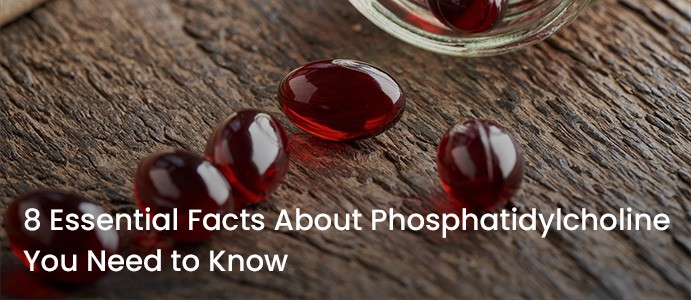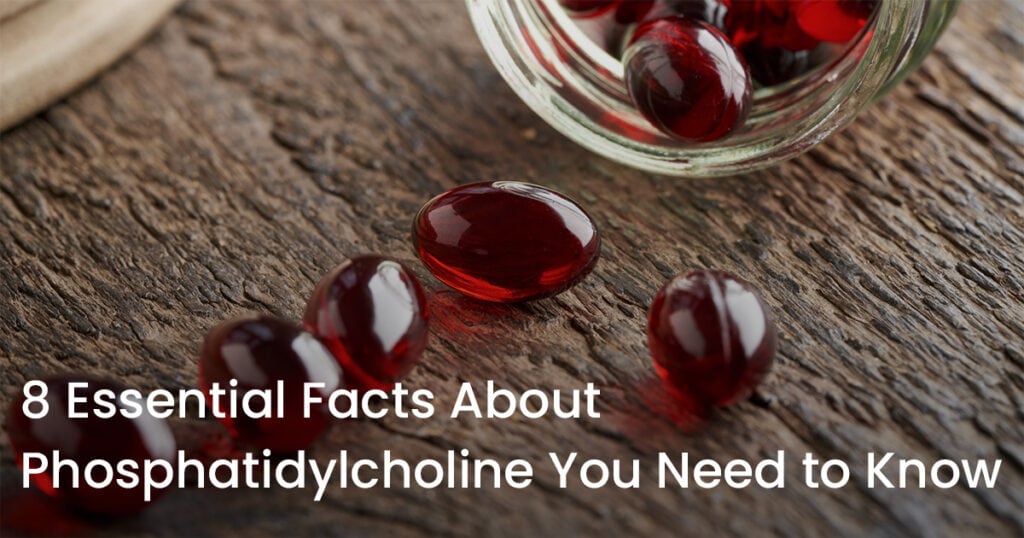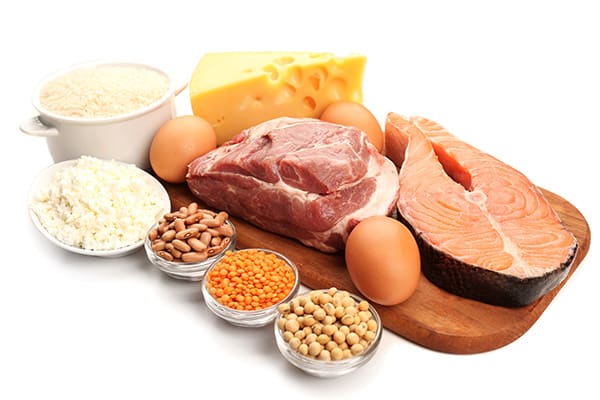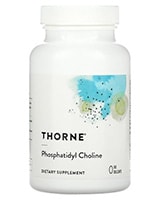

Phosphatidylcholine is an important molecule in our body. It has many jobs, from being a part of our cell walls to helping with brain functions. In this article, we’ll learn more about what Phosphatidylcholine is, what it does, and why it’s important for our health.
1. What is Phosphatidylcholine?
Phosphatidylcholine, often shortened to PC, is found in the outer layer of our cell walls. It’s a type of fat that helps keep the cell’s shape and protects what’s inside[1]Van der Veen, J. N., Kennelly, J. P., Wan, S., Vance, J. E., Vance, D. E., & Jacobs, R. L. (2017). The critical role of phosphatidylcholine and phosphatidylethanolamine metabolism in health and disease. Biochimica et Biophysica Acta (BBA) – Biomembranes, 1859(9), 1558-1572.. PC also helps make a brain chemical called acetylcholine, which is important for memory and other brain functions. Plus, it helps break down fats in our food so our bodies can use them[2]Lagace, T. A. (2016). Phosphatidylcholine: Greasing the Cholesterol Transport Machinery. Lipid Insights, 8(suppl 1), 65-73..
2. Phosphatidylcholine Benefits
Phosphatidylcholine isn’t just a part of our cell walls; it has many benefits for our health. First, it helps our liver work properly, especially when it’s damaged by things like alcohol or certain medicines. PC also supports our brain, helping with memory and mood. For people who take supplements, Phosphatidylcholine can help with some skin conditions and improve gut health[3]Treede, I., Braun, A., Sparla, R., Kühnel, M., Giese, T., Turner, J. R., … & Ehehalt, R. (2007). Anti-inflammatory effects of phosphatidylcholine. Journal of Biological Chemistry, 282(37), 27155-27164..
3. Is Phosphatidyl Choline a Vitamin?
Phosphatidylcholine is important for our health, but it’s not a vitamin[4]Wang, Z., Klipfell, E., Bennett, B. J., Koeth, R., Levison, B. S., Dugar, B., … & Gregory, J. C. (2011). Intestinal microbial metabolism of phosphatidylcholine and cardiovascular risk. New England Journal of Medicine, 366(17), 1575-1585.. Vitamins are specific nutrients that our bodies need but can’t make on their own. We get them from food or supplements. PC is made by our body, and we also get it from foods like eggs and soybeans. So, while it’s essential, it’s not classified as a vitamin.
4. What does Phosphatidylcholine do in the Liver?
The liver is a vital organ, and Phosphatidylcholine plays a key role in keeping it healthy. PC helps protect the liver from damage[5]Maev, I. V., Samsonov, A. A., Palgova, L. K., Pavlov, C. S., Shirokova, E. N., Vovk, E. I., & Starostin, K. M. (2020). Effectiveness of phosphatidylcholine as adjunctive therapy in improving liver function tests in patients with nonalcoholic fatty liver disease and metabolic comorbidities: real-life observational study from Russia. BMJ Open Gastroenterol, 7(1), e000368., especially from harmful substances like alcohol or certain drugs. When the liver is damaged, it can’t break down fats properly. PC helps by making sure fats move out of the liver and get used by the body. This helps prevent fat buildup, which can lead to more serious liver problems.
5. Best Sources of Phosphatidylcholine

You can find Phosphatidylcholine in many foods. Some of the best sources are eggs, soybeans, and meats like liver and chicken. If you’re looking to boost your PC intake, these foods are a good place to start. There are also supplements available that contain Phosphatidylcholine. If you’re thinking about taking a supplement, it’s a good idea to talk to a doctor or nutritionist first.
6. Phosphatidylcholine Injections and IV
Phosphatidylcholine injections and IV (intravenous) treatments are methods some people use to get more PC into their bodies. These treatments can be used for various reasons, including:
- Fat Reduction: Some believe that PC injections can help break down fat in specific areas of the body.
- Liver Health: IV treatments can help deliver PC directly to the liver, potentially aiding in its function.
- Skin Conditions: PC injections are sometimes used to treat certain skin conditions.
However, it’s essential to note that while some people might see benefits, there can be risks. It’s always best to talk to a medical professional before considering such treatments.
7. Phosphatidylcholine Structure and Liposomal Forms
At its core, Phosphatidylcholine is made up of a head and two tails[6]Vance, J. E., Vance, D. E., Van der Veen, J. N., Kennelly, J. P., & Wan, S. (2017). The critical role of phosphatidylcholine and phosphatidylethanolamine metabolism in health and disease. Biochimica et Biophysica Acta (BBA) – Biomembranes, 1859(9), 1558-1572.. This structure allows it to mix with both water and fats, making it perfect for forming cell walls. Recently, there’s been interest in liposomal forms of PC. Liposomes are tiny bubbles made of the same material as cell walls. They can carry drugs or other substances inside and deliver them directly to cells. This can make treatments more effective and reduce side effects.
8. Is Phosphatidylserine the same as Phosphatidylcholine?
Phosphatidylserine and Phosphatidylcholine might sound similar, but they are different molecules with unique roles in the body. Both are types of phospholipids, which means they help form cell walls. However, their functions vary:
- Phosphatidylserine (PS): This molecule is mainly found in the brain and plays a role in cell signalling and communication. It’s also believed to support cognitive functions like memory and concentration.
- Phosphatidylcholine (PC): As we’ve discussed, PC is essential for cell structure, liver health, and fat metabolism. It’s also a precursor for the neurotransmitter acetylcholine.
While both are important for health, they serve different purposes and are not the same.
Conclusion
Phosphatidylcholine is more than just a complex name; it’s a crucial molecule that supports various functions in our body. From forming the protective barrier of our cells to aiding in liver health and fat digestion, its roles are diverse and vital. As we’ve seen, it’s closely related to other phospholipids, each with its unique benefits. Understanding these molecules better can give us insights into our health and how to support our body’s functions.
Buy Phosphatidylcholine Online Review Comparison Table
| Product | Company | Quantity | Price | Country | Website |
 Phosphatidylcholine | iHerb | 60 pills (420mg) | $30.00 |  Worldwide, AU | Visit Website >> |
References
| ↑1 | Van der Veen, J. N., Kennelly, J. P., Wan, S., Vance, J. E., Vance, D. E., & Jacobs, R. L. (2017). The critical role of phosphatidylcholine and phosphatidylethanolamine metabolism in health and disease. Biochimica et Biophysica Acta (BBA) – Biomembranes, 1859(9), 1558-1572. |
|---|---|
| ↑2 | Lagace, T. A. (2016). Phosphatidylcholine: Greasing the Cholesterol Transport Machinery. Lipid Insights, 8(suppl 1), 65-73. |
| ↑3 | Treede, I., Braun, A., Sparla, R., Kühnel, M., Giese, T., Turner, J. R., … & Ehehalt, R. (2007). Anti-inflammatory effects of phosphatidylcholine. Journal of Biological Chemistry, 282(37), 27155-27164. |
| ↑4 | Wang, Z., Klipfell, E., Bennett, B. J., Koeth, R., Levison, B. S., Dugar, B., … & Gregory, J. C. (2011). Intestinal microbial metabolism of phosphatidylcholine and cardiovascular risk. New England Journal of Medicine, 366(17), 1575-1585. |
| ↑5 | Maev, I. V., Samsonov, A. A., Palgova, L. K., Pavlov, C. S., Shirokova, E. N., Vovk, E. I., & Starostin, K. M. (2020). Effectiveness of phosphatidylcholine as adjunctive therapy in improving liver function tests in patients with nonalcoholic fatty liver disease and metabolic comorbidities: real-life observational study from Russia. BMJ Open Gastroenterol, 7(1), e000368. |
| ↑6 | Vance, J. E., Vance, D. E., Van der Veen, J. N., Kennelly, J. P., & Wan, S. (2017). The critical role of phosphatidylcholine and phosphatidylethanolamine metabolism in health and disease. Biochimica et Biophysica Acta (BBA) – Biomembranes, 1859(9), 1558-1572. |

Leave a Reply